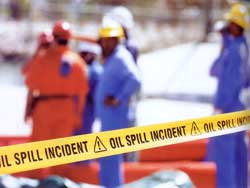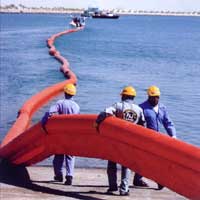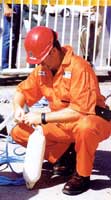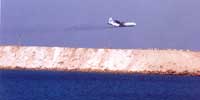Just Too Slick
Despite being a country that has grown up on a diet of oil and natural
resources, the United Arab Emirates has faced criticism for its reaction to
environmental disasters. Not any more though, as David Williams found out
 January 1998 was a black month in the history of the UAE. Disaster struck the
seas in the north of the Emirates when a sanction-busting Iranian barge
smuggling 4,000 tonnes of medium fuel oil from Iraq sunk five kilometres off
shore, turning the golden beaches and pristine mangroves of Umm Al Quwain into
a mass of black sludge.
January 1998 was a black month in the history of the UAE. Disaster struck the
seas in the north of the Emirates when a sanction-busting Iranian barge
smuggling 4,000 tonnes of medium fuel oil from Iraq sunk five kilometres off
shore, turning the golden beaches and pristine mangroves of Umm Al Quwain into
a mass of black sludge.
The northern emirate's wealth of bird life and rich fishing grounds were
decimated almost overnight, not to mention the flora and fauna which had
become a growing attraction to tourists. Its effects even touched the beaches
of Dubai some 100 kms south of the sunken wreck.
It was an environmental nightmare of Freddie Kruger proportions and the
delayed clean-up operation which followed was much-maligned despite reaching
its eventual goal of returning the area to its former glory.
The Umm Al Quwain slick came four years after a Panamanian registered oil
tanker, the Seki, and a UAE vessel, the Baynunah, collided in the waters off
Fujairah and transformed its surf into a wash of black with 9,000 tonnes of
crude oil contributing to the country's largest individual oil spill in
history.
With 22 million barrels of oil chugging past the UAE coast daily, many in the
industry may say that the two aforementioned slicks are mere drops in the
ocean. But, with industry analysts recognising that 10,000 barrels seep into
the Gulf waters every day and remembering a well-known phrase that 'disasters
do happen', the UAE has decided to act to prevent, or minimise, oil slick
devastation in the future and to improve its reaction time to thwarting
unwanted black gold coming ashore.
Last month, almost six years since its biggest oil spill, the UAE staged its
largest ever exercise off Abu Dhabi to show how far the country has advanced
in combating slicks and potential environmental disasters.
 'Exercise Ghazal' was organised by the Abu Dhabi National Oil Company's
environment and safety division crisis management office to test the
organisation's response.
'Exercise Ghazal' was organised by the Abu Dhabi National Oil Company's
environment and safety division crisis management office to test the
organisation's response.
The occasion attracted petroleum officials from the region and beyond,
including Japan who sent a large contingent from its national association to
Abu Dhabi.
Exercise Ghazal assumed that a British Petrolium-owned and operated oil tanker
had collided with a fishing vessel, spilling thousands of tonnes of crude oil
into the Gulf, with the slick heading full steam ahead to the capital's coast
line.
It was then a race against time to find out how the industry would respond,
and the results were impressive.
Four protective booms, each of them 500 metres long, were also constructed to
stop the imaginary spill reaching the Abu Dhabi shore, while skimming units
were also deployed.
The booms acted as an oil fence and its purpose is to corral the oil in order
to prevent the slick spreading and ultimately hitting the shore and also to
make recovery easier. The recovery can be preformed from one of the vessels
that is towing the boom.
Booms are manufactured in a range of sizes and for various applications. Dubai
Creek has a permanent boom near Al Jaddaf to protect the creek from possible
discharge from the vessels at the Shipyard. Booms used during the exercise
were Vikoma booms, 'The Shoreguardian' for the onshore deployment and the
'Hi-sprint' for the offshore deployment.
 Skimmers are used to skim the oil that collects on the sea's surface, which is
then pumped into a collection barge or tank.
Skimmers are used to skim the oil that collects on the sea's surface, which is
then pumped into a collection barge or tank.
The booms and skimmers used in the exercise were manufactured by Vikoma
International, a company founded in 1976 and with sales to over 120 countries
worldwide. It's agent in the UAE is Lamnalco, who are the maintenance
contractors for the Petroleum Association of Japan's oil response equipment
stockpile in Mussafah, Abu Dhabi. They also have trained operators to utilise
the equipment, and it was the same equipment that was used to clean up in Umm
Al Quwain almost two years ago.
Glyn Higginson, Lamnalco's Marketing Manager (Onshore services), was heavily
involved in that clean-up operation and he knows as well as anyone the damage
that can be caused from such slicks.
"As I was personally involved with the last big spill that the UAE experienced
and having witnessed first hand the damage that this can cause the local
environment, it is very encouraging to see local agencies and private
companies seeking to work together to prevent such a disaster occurring again.
Hopefully through Exercise Ghazal and other response initiatives we can
improve the overall response should another spill occur.
"Only through joint initiatives such as Exercise Ghazal and through the
presence of international organisation such as The Petroleum Association of
Japan and Oil Spill Response Ltd can the profile of oil spill response in the
UAE be raised and more importantly it's necessity be realised."
Should an oil spill occur, the PAJ would be contacted by a responding party,
for example ADNOC for the UAE, and once permission had been given for them to
borrow the equipment, Lamnalco would be informed. The 'borrower' can then ask
Lamnalco to mobilise the stockpile should they wish and in addition to this
provide operators to handle the equipment. PAJ normally recommends the
maintenance contractor for the mobilisation.
Exercise Ghazal involved both local and international organisations, and
included the use of a massive Hercules C130, specially converted to spray
dispersant to the effected site. The plane, more familiar with humanitarian
food drops than fighting oil slicks, made two overhead passes of the area,
spraying water on this occasion instead of the oil-dispersing fluids.
The plane was specially flown in by the Oil Spill Response Ltd which is the
most influential organisation in the fight against oil pollution.
An Oil Spill Service Centre was set up by BP in Southampton in 1980 as a
direct result of an incident in 1978 when a tanker carrying a BP cargo
grounded off the Pembrokeshire coast. In 1985 BP invited other oil companies
to share in the running costs of the Centre and Oil Spill Response Limited
(OSRL) was established as a joint venture company with funding provided by BP,
Texaco, Shell, Mobil and PetroCanada.
In April 1989, the Exxon Valdez ran aground in Prince William Sound and the
oil industry collectively decided that contingency measures should be put in
place to ensure that a credible Tier 3 response capability was established.
The members of OSRL are shareholders in the company paying an initial
contribution towards the capital cost of equipment together with an annual
subscription to cover the costs of running the Centre.
 OSRL is now owned by over 20 international oil corporations, demonstrating
their responsible and committed approach to oil spill response. Full
membership is available to any international oil company and associate
membership is also available for single site operations.
OSRL is now owned by over 20 international oil corporations, demonstrating
their responsible and committed approach to oil spill response. Full
membership is available to any international oil company and associate
membership is also available for single site operations.
OSRL's base at Southampton houses the largest global response facility in the
world providing its members with their primary world-wide response capability.
In line with the recommendations of the industry working party, the base has a
stockpile of equipment which is capable of responding to two simultaneous
spills of 30,000 tonnes each.
The growth of the company in recent years has resulted in an increase in
staffing levels and it now occupies all the site at Southampton. In 1991 the
site was fully refurbished and it now includes a dedicated training school and
conference facilities.
Each shareholder appoints a director to the Board of OSRL. The Board has
appointed a Management Committee to oversee its running. This Management
Committee meets monthly to receive both financial and operational reports from
OSRL and also to review any matters which fall outside the normal operational
areas of the business.
Overseeing OSRL's operation in Abu Dhabi was Archie Smith who joined OSRL in
1995 at the time when the organisation took over the daily management of the
Southampton centre from BP.
As Chief Executive, he is responsible for the overall management and
development of the company. Although based primarily in the London Office,
Archie also has a desk in the Southampton office but has spread OSRL's gospel
to just about every oil-producing region in the world.
Previously a director of a major offshore oil services company, Archie has
spent most of his adult life in the industry and has been involved in the
management of companies and major contracts in the UK, USA, Mexico, West
Africa and the Middle and Far East.
He is well-aware of the criticism the UAE has come in for in the past, but
believes its oil spill response standards are improving rapidly.
"It's unfair to draw comparisons between the UAE and other parts of the world,
but I would say Abu Dhabi has taken considerable steps to improve recently and
has invested a lot of money in doing so," he said.
"All the ingredients are in place now to respond to major incidents and it was
just a case of making sure all the systems work which was the point of
Exercise Ghazal. They have done an excellent job.
"These exercises are extremely important all around the world. It's terrible
to say, but in the past, many countries have waited until a major catastrophe
has happened until they react. Now I'm glad to say that countries are keen to
carry out these exercises, and it's only through these continuous exercises
that improvements can be made.
"The UAE has realised the importance of environmental protection and has made
a major investment to ensure its oil production is not detracting from the
surrounding wildlife and countryside."
"The UAE has picked up on the message we are trying to get across to other
countries. It has shown a tremendous willingness to listen and learn."
The massive Hercules aeroplane was a highlight of the operation and an
integral part of any OSRL operation.
The organisation has teamed up with an aircraft service provider to
specially-adapt the Hercules which is based in the UK. It's response time
mirrors the efficiency of OSRL, with the plane ready for take-off from
Southampton within three hours of a reported slick. It can be manned 24 hours
a day and 365 days a year by a highly trained crew.
So with oil set to continue to play an integral role in the UAE's continual
growth, environmentalists can rest assure that every effort is being made to
keep its coastline's clean.